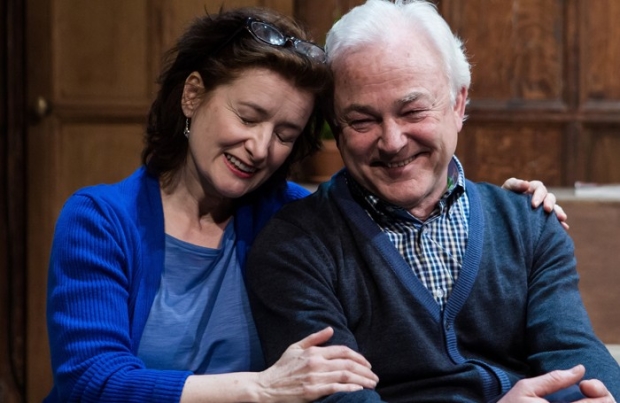Every One (Battersea Arts Centre)

© Richard Davenport
Mary Jane Hunter-Spring is doing the ironing when her shoulder goes numb with the start of a stroke. Her teenage son, Kev, is watching TV. Her daughter’s sleeping off a hangover upstairs, and her husband’s out shopping – probably getting irritated by Anya potatoes. In a nearby nursing home, her mother’s sat in a wheelchair, unable to express herself or control her bladder. Death slowly stands up from his seat in the audience and steps onto the stage – rosy-cheeked, well-dressed and gentle. "I love watching people doing the ironing," he purrs, reflectively. "It’s such a potent symbol of futility."
Jo Clifford’s play is a quietly radical reworking of Everyman, the medieval morality play seen at the National last year. Where Rufus Norris gave it a glow-stick and a line of coke, however, Clifford offers a cup of tea and a DMC. She welcomes the myth into the family home – the Everyhome, if you like – and teases its universality out of day-to-day domesticity. Her writing knows the pleasure of breathing in a blue sky and the irritation of ironing a ruffled shirt. It’s a play about taking stock – and Chris Goode’s contemplative production lets us do just that.
Goode’s theatre has grown increasingly utopian in recent years – not just in spirit, but in practice. His book, The Forest and the Field, outlines a belief in theatre as an alternative to capitalism, a way of creating pop-up spaces that might linger on into lasting change. Every One is, perhaps, the best realisation of that to date. It provides pause for thought and charges us to make change.
It’s a deeply compassionate piece though, that understands why we might fail to do so. Clifford’s play asks what’s important – really important – but it forgives us our transiences as well. If Kev’s computer game habit looks like wasted time, it’s just his way of hiding from himself. If his fashion-conscious sister seems vain, she’s just taking pride in her appearance. It’s understandable – the world isn’t ideal – but that doesn’t mean it’s not regrettable.
Every One invites us to see both sides of everything: a mother’s nagging frustration and a son’s irritation at being nagged. We are all all of these people at some point or other – children and parents, carers and dependents – and we’re all heading to the same ending. Death pushes the point further, zooming out from the nuclear family to global inequalities and historical injustices. Our lives, Clifford insists, are not half as significant as they seem to us – let alone our immediate struggles and squabbles.
There’s comfort in that, and in the play’s portrayal of death as a benign presence. Who better to meet your maker with – whatever that maker might be – than Nigel Barrett in his gladrags? A human bear-hug, he must be the world’s most reassuring presence. Clifford gives voice to the deceased too, to their bereavement and loss – something only art can make possible.
It’s gorgeously designed by Naomi Dawson – a here-and-now performance space, dotted with pot-plants and bookshelves, that suggests both a family home and the underworld. Goode takes us from this world to the next just by closing the curtains and dimming the lights. He literally tilts time – a working wall-clock does a Dali somehow – and lets us dance with death.
Yes, occasionally you crave more humour, less piety, but this is restorative stuff – phone home theatre, soul wash art. That’s rare. It’s precious.
Every One runs at Battersea Arts Centre until 19th March.










